Unit 3 Language in use Module 4 Rules and suggestions课件(共33张PPT)
文档属性
| 名称 | Unit 3 Language in use Module 4 Rules and suggestions课件(共33张PPT) |
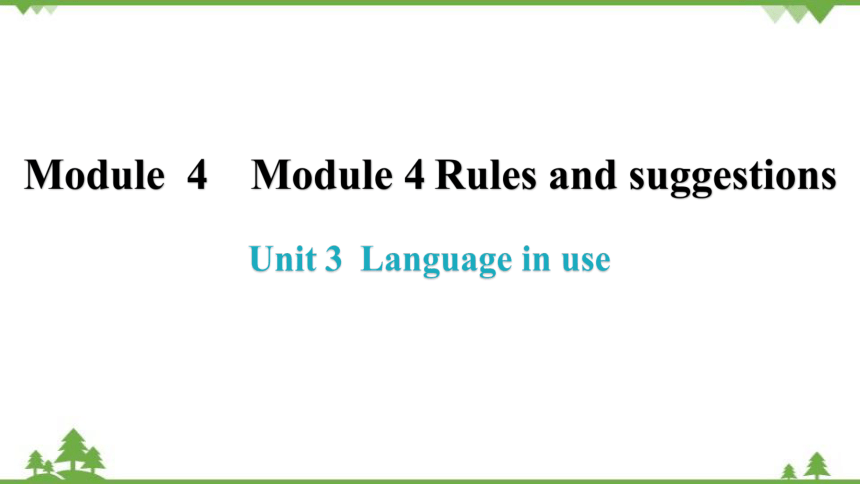
|
|
| 格式 | pptx | ||
| 文件大小 | 121.8KB | ||
| 资源类型 | 教案 | ||
| 版本资源 | 外研版 | ||
| 科目 | 英语 | ||
| 更新时间 | 2022-06-16 00:00:00 | ||
图片预览

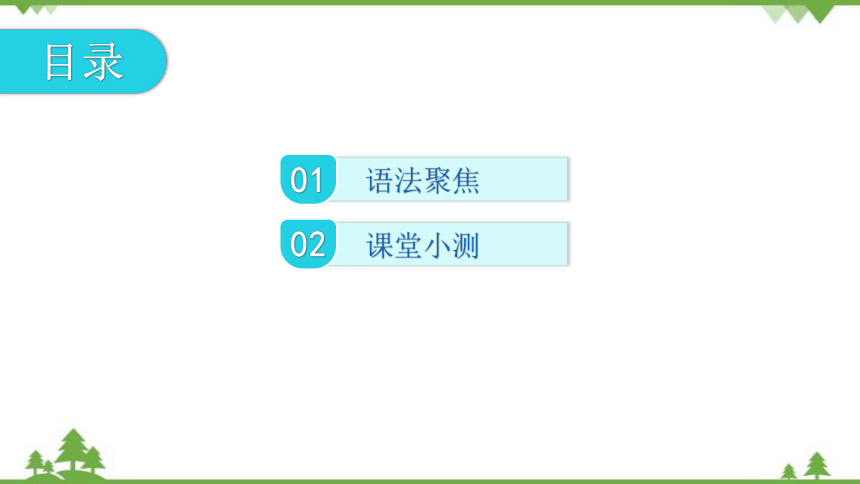
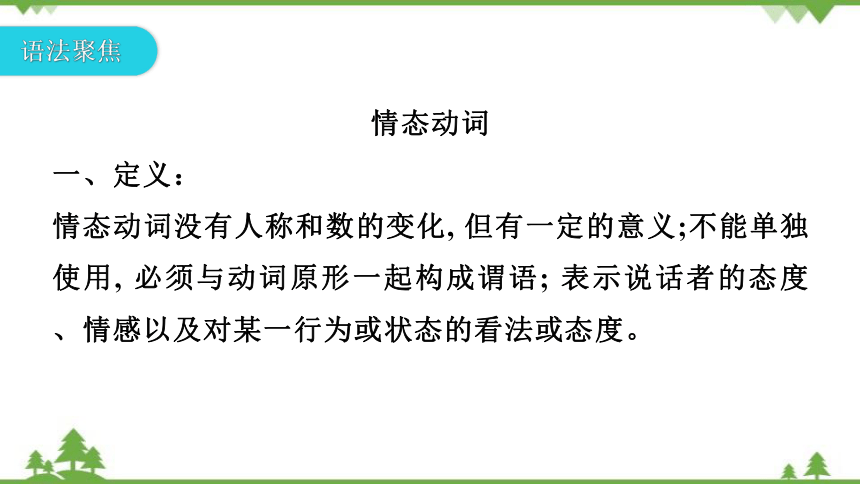

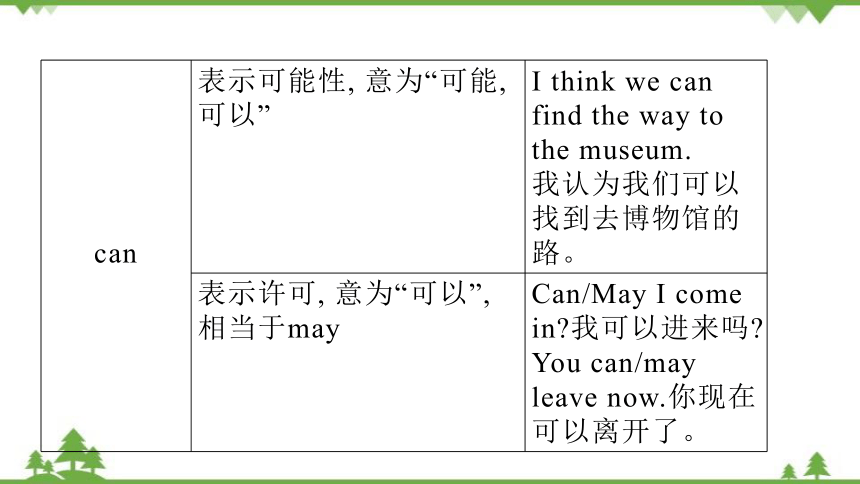
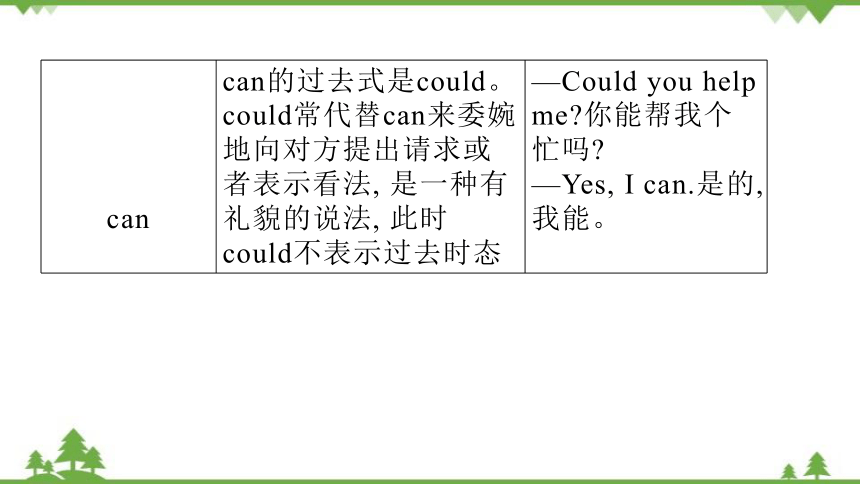
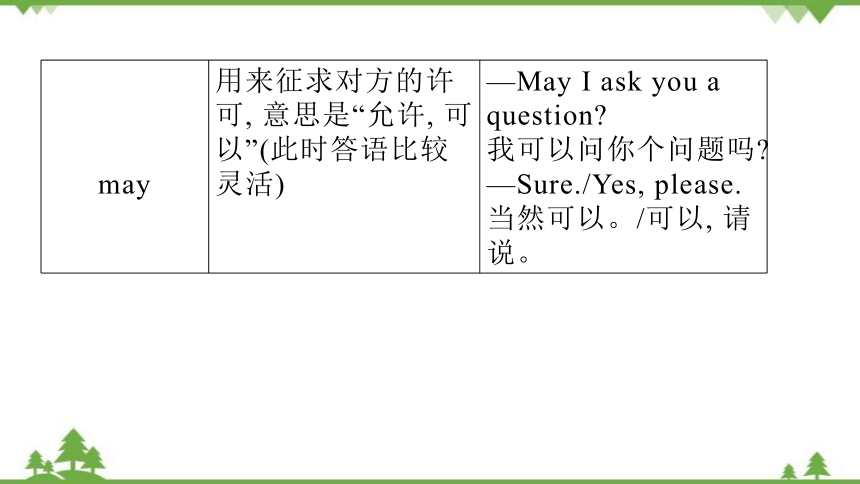
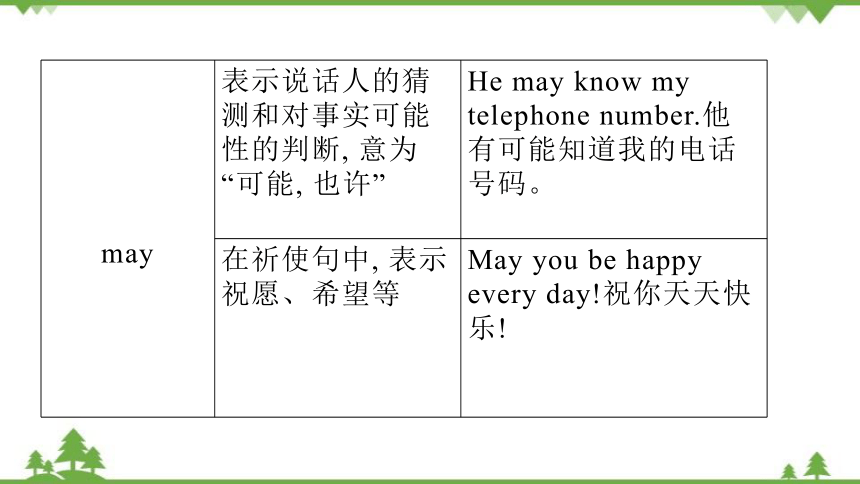
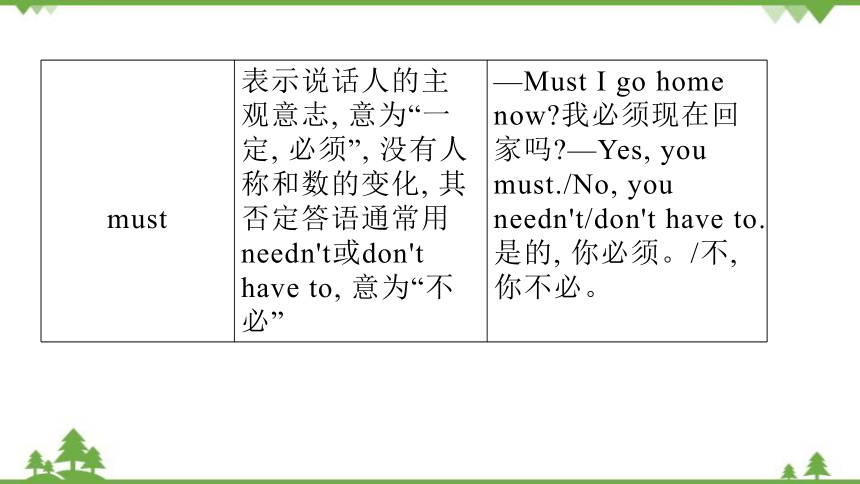
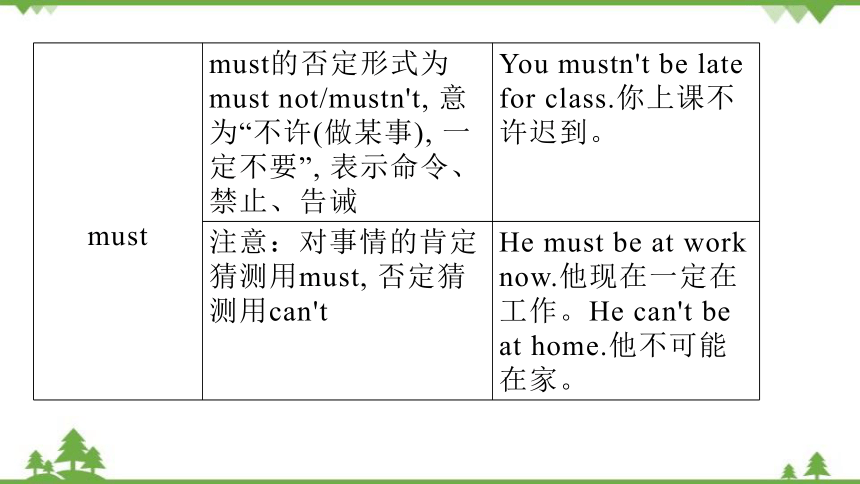
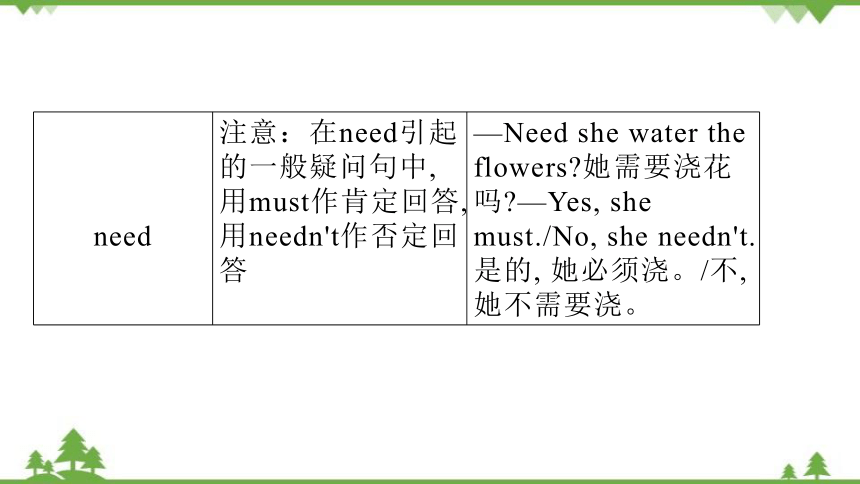
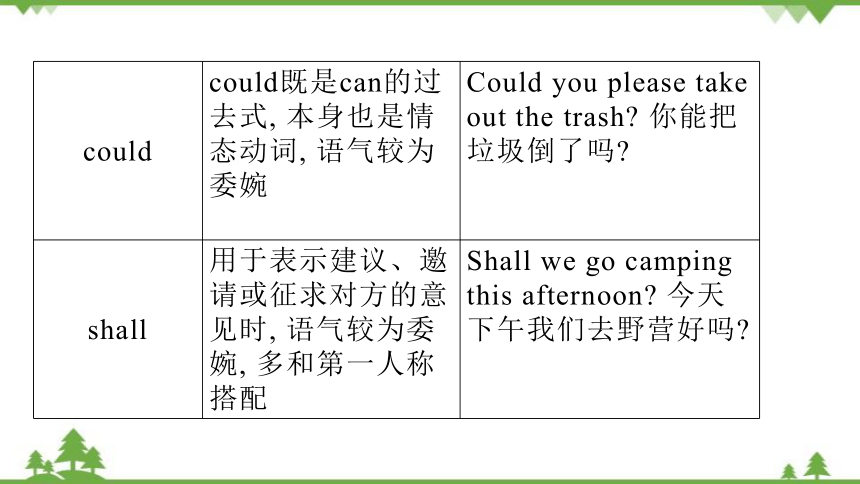
文档简介
(共33张PPT)
Unit 3 Language in use
Module 4 Module 4 Rules and suggestions
目录
语法聚焦
01
课堂小测
02
语法聚焦
情态动词
一、定义:
情态动词没有人称和数的变化, 但有一定的意义;不能单独使用, 必须与动词原形一起构成谓语; 表示说话者的态度、情感以及对某一行为或状态的看法或态度。
二、情态动词的用法归纳
情态动词 用法 举例
can 表示具有某种能力, 意思是“能, 会”, 与be able to的意义基本相同, 但can只用于一般现在时和一般过去时, 而be able to能用于多种时态 I can swim.我会游泳。
Can you /Will you be able to work out the difficult maths problem 你能解答出这道数学难题吗
can 表示可能性, 意为“可能, 可以” I think we can find the way to the museum.
我认为我们可以找到去博物馆的路。
表示许可, 意为“可以”, 相当于may Can/May I come in 我可以进来吗
You can/may leave now.你现在可以离开了。
can can的过去式是could。could常代替can来委婉地向对方提出请求或者表示看法, 是一种有礼貌的说法, 此时could不表示过去时态 —Could you help me 你能帮我个忙吗
—Yes, I can.是的, 我能。
may 用来征求对方的许可, 意思是“允许, 可以”(此时答语比较灵活) —May I ask you a question
我可以问你个问题吗
—Sure./Yes, please.当然可以。/可以, 请说。
may 表示说话人的猜测和对事实可能性的判断, 意为“可能, 也许” He may know my telephone number.他有可能知道我的电话号码。
在祈使句中, 表示祝愿、希望等 May you be happy every day!祝你天天快乐!
must 表示说话人的主观意志, 意为“一定, 必须”, 没有人称和数的变化, 其否定答语通常用needn't或don't have to, 意为“不必” —Must I go home now 我必须现在回家吗 —Yes, you must./No, you needn't/don't have to.是的, 你必须。/不, 你不必。
must must的否定形式为must not/mustn't, 意为“不许(做某事), 一定不要”, 表示命令、禁止、告诫 You mustn't be late for class.你上课不许迟到。
注意:对事情的肯定猜测用must, 否定猜测用can't He must be at work now.他现在一定在工作。He can't be at home.他不可能在家。
need 注意:在need引起的一般疑问句中, 用must作肯定回答, 用needn't作否定回答 —Need she water the flowers 她需要浇花吗 —Yes, she must./No, she needn't.是的, 她必须浇。/不, 她不需要浇。
could could既是can的过去式, 本身也是情态动词, 语气较为委婉 Could you please take out the trash 你能把垃圾倒了吗
shall 用于表示建议、邀请或征求对方的意见时, 语气较为委婉, 多和第一人称搭配 Shall we go camping this afternoon 今天下午我们去野营好吗
should 表示应该、义务, 意为“应该”, 否定形式是shouldn’t, 意为“不应该” You should ask your parents for help.你应该向你的父母求助。
shall 用于表示建议、邀请或征求对方的意见时, 语气较为委婉, 多和第一人称搭配 Shall we go camping this afternoon 今天下午我们去野营好吗
have to 强调受客观原因所迫而不得不做某事。主语是第三人称单数时, 要用has to。have to变否定或疑问句时要借助助动词do的相应形式 She has to stay at home and look after her sick mother.她不得不待在家里, 照顾她生病的妈妈。
Do you have to go 你非得走吗
had better 后跟动词原形。had better do sth.意为“最好做某事”;否定结构是 had better not do sth. You'd better take the advice.你最好接受这个建议。
课堂小测
一、根据句意及首字母提示,用适当的情态动词填空,每空一词
1. If you want to go swimming, remember you_____ go with an adult(成年人).
2. —____ I park my car here for a short while
—Sorry, it's not allowed to park here.
must
May
3. You ______ care about what people think. Anyway, you're not alone in this world.
4. I don't think I ____ eat up all the food. I'm already full now.
5. —____ we get our job done tonight
—Yes, you must.
should
can
Need
二、找出下列句子的错误,并在横线上进行更正
6. The man is feeling much better now, so you mustn't call a doctor.
________________________________________
7. I am not sure what I will do next week. I must work in an old people's home.
________________________________________
mustn’t改为needn’t
must改为may
8. It's half past two. I think we had better not to stay in bed. ________________________________________
9. Some teachers in this school must live out because there're not enough dormitories.
________________________________________
had better not to改为had better not
must改为have to
10. Someone can’t be at home because the light in the house is still on.
________________________________________
can’t 改为must
三、单项填空(语法专练)
( )11. —Must I finish the work tonight
—No, you. But you finish it tomorrow.
A. can’t; need
B. mustn’t; may
C. needn’t; must
D. mustn’t; can
C
( )12.—Is the man over there Mr Brown
—It him. He has gone to Brazil.
A. may not B. can't be C. shouldn't D. mustn't
B
( )13. — I know by what time you want the project to be done
—By the day after tomorrow. you finish it on time
A. May; Can B. Must; Need
C. Could; Must D. Need; Would
A
( )14. —Could you please go to the cinema with me this afternoon
—Sorry, I_____. I_____take a piano lesson at 2 pm.
A. couldn’t;have to B. can’t;would
C. can’t;have to D. couldn’t;will
C
( )15. Please turn off your computer now! You play on it too long.
A. couldn’t B. mustn’t
C. wouldn’t D. needn’t
B
四、语法选择(核心素养:语言能力)
According to a new survey, students' safety has become a big problem. Many students are injured or__16__ in different kinds of accidents.
Here is some advice for young students__17__ how to deal with danger.
If you are robbed(被抢劫), keep calm. If you can not cry for help or run away, give the robber(强盗) your money. Try to remember__18__ and tell the police later.
Suppose you are in__19__ traffic accident. If a car__20__ you, you should remember the car number. If it is a bicycle, try to call your parents before you let the rider go. This is__21__ you don't know how seriously you are hurt.
If it is raining__22__ and there is lightning,__23__ in high places and stay away from trees.
When there is a fire in a building, get away as fast as you __24__ . Put wet things on your body and try to find an exit(出口). Don't take the lift.
If someone is drowning(溺水) and you__25__ swim, don't get into the water. Try your best to ask for help.
Remember that danger is never as far away as you think. Take care of yourself at all times!
( )16. A. kill B. killed
C. kills D. killing
( )17. A. with B. in
C. on D. at
( )18. A. how does the robber look like
B. who is the robber like
C. what does the robber look like
D. what the robber looks like
( )19. A. a B. an
C. the D. /
B
C
D
A
( )20. A. hit B. will hit
C. is hit D. hits
( )21. A. unless B. why
C. because D. before
( )22. A. heavier B. heavily
C. heavy D. heaviest
( )23. A. stay B. no stay
C. not stay D. don't stay
( )24. A. can B. may
C. must D. need
D
C
B
A
D
( )25. A. can B. can’t
C. may D. couldn't
B
课后作业
Unit 3 Language in use
Module 4 Module 4 Rules and suggestions
目录
语法聚焦
01
课堂小测
02
语法聚焦
情态动词
一、定义:
情态动词没有人称和数的变化, 但有一定的意义;不能单独使用, 必须与动词原形一起构成谓语; 表示说话者的态度、情感以及对某一行为或状态的看法或态度。
二、情态动词的用法归纳
情态动词 用法 举例
can 表示具有某种能力, 意思是“能, 会”, 与be able to的意义基本相同, 但can只用于一般现在时和一般过去时, 而be able to能用于多种时态 I can swim.我会游泳。
Can you /Will you be able to work out the difficult maths problem 你能解答出这道数学难题吗
can 表示可能性, 意为“可能, 可以” I think we can find the way to the museum.
我认为我们可以找到去博物馆的路。
表示许可, 意为“可以”, 相当于may Can/May I come in 我可以进来吗
You can/may leave now.你现在可以离开了。
can can的过去式是could。could常代替can来委婉地向对方提出请求或者表示看法, 是一种有礼貌的说法, 此时could不表示过去时态 —Could you help me 你能帮我个忙吗
—Yes, I can.是的, 我能。
may 用来征求对方的许可, 意思是“允许, 可以”(此时答语比较灵活) —May I ask you a question
我可以问你个问题吗
—Sure./Yes, please.当然可以。/可以, 请说。
may 表示说话人的猜测和对事实可能性的判断, 意为“可能, 也许” He may know my telephone number.他有可能知道我的电话号码。
在祈使句中, 表示祝愿、希望等 May you be happy every day!祝你天天快乐!
must 表示说话人的主观意志, 意为“一定, 必须”, 没有人称和数的变化, 其否定答语通常用needn't或don't have to, 意为“不必” —Must I go home now 我必须现在回家吗 —Yes, you must./No, you needn't/don't have to.是的, 你必须。/不, 你不必。
must must的否定形式为must not/mustn't, 意为“不许(做某事), 一定不要”, 表示命令、禁止、告诫 You mustn't be late for class.你上课不许迟到。
注意:对事情的肯定猜测用must, 否定猜测用can't He must be at work now.他现在一定在工作。He can't be at home.他不可能在家。
need 注意:在need引起的一般疑问句中, 用must作肯定回答, 用needn't作否定回答 —Need she water the flowers 她需要浇花吗 —Yes, she must./No, she needn't.是的, 她必须浇。/不, 她不需要浇。
could could既是can的过去式, 本身也是情态动词, 语气较为委婉 Could you please take out the trash 你能把垃圾倒了吗
shall 用于表示建议、邀请或征求对方的意见时, 语气较为委婉, 多和第一人称搭配 Shall we go camping this afternoon 今天下午我们去野营好吗
should 表示应该、义务, 意为“应该”, 否定形式是shouldn’t, 意为“不应该” You should ask your parents for help.你应该向你的父母求助。
shall 用于表示建议、邀请或征求对方的意见时, 语气较为委婉, 多和第一人称搭配 Shall we go camping this afternoon 今天下午我们去野营好吗
have to 强调受客观原因所迫而不得不做某事。主语是第三人称单数时, 要用has to。have to变否定或疑问句时要借助助动词do的相应形式 She has to stay at home and look after her sick mother.她不得不待在家里, 照顾她生病的妈妈。
Do you have to go 你非得走吗
had better 后跟动词原形。had better do sth.意为“最好做某事”;否定结构是 had better not do sth. You'd better take the advice.你最好接受这个建议。
课堂小测
一、根据句意及首字母提示,用适当的情态动词填空,每空一词
1. If you want to go swimming, remember you_____ go with an adult(成年人).
2. —____ I park my car here for a short while
—Sorry, it's not allowed to park here.
must
May
3. You ______ care about what people think. Anyway, you're not alone in this world.
4. I don't think I ____ eat up all the food. I'm already full now.
5. —____ we get our job done tonight
—Yes, you must.
should
can
Need
二、找出下列句子的错误,并在横线上进行更正
6. The man is feeling much better now, so you mustn't call a doctor.
________________________________________
7. I am not sure what I will do next week. I must work in an old people's home.
________________________________________
mustn’t改为needn’t
must改为may
8. It's half past two. I think we had better not to stay in bed. ________________________________________
9. Some teachers in this school must live out because there're not enough dormitories.
________________________________________
had better not to改为had better not
must改为have to
10. Someone can’t be at home because the light in the house is still on.
________________________________________
can’t 改为must
三、单项填空(语法专练)
( )11. —Must I finish the work tonight
—No, you. But you finish it tomorrow.
A. can’t; need
B. mustn’t; may
C. needn’t; must
D. mustn’t; can
C
( )12.—Is the man over there Mr Brown
—It him. He has gone to Brazil.
A. may not B. can't be C. shouldn't D. mustn't
B
( )13. — I know by what time you want the project to be done
—By the day after tomorrow. you finish it on time
A. May; Can B. Must; Need
C. Could; Must D. Need; Would
A
( )14. —Could you please go to the cinema with me this afternoon
—Sorry, I_____. I_____take a piano lesson at 2 pm.
A. couldn’t;have to B. can’t;would
C. can’t;have to D. couldn’t;will
C
( )15. Please turn off your computer now! You play on it too long.
A. couldn’t B. mustn’t
C. wouldn’t D. needn’t
B
四、语法选择(核心素养:语言能力)
According to a new survey, students' safety has become a big problem. Many students are injured or__16__ in different kinds of accidents.
Here is some advice for young students__17__ how to deal with danger.
If you are robbed(被抢劫), keep calm. If you can not cry for help or run away, give the robber(强盗) your money. Try to remember__18__ and tell the police later.
Suppose you are in__19__ traffic accident. If a car__20__ you, you should remember the car number. If it is a bicycle, try to call your parents before you let the rider go. This is__21__ you don't know how seriously you are hurt.
If it is raining__22__ and there is lightning,__23__ in high places and stay away from trees.
When there is a fire in a building, get away as fast as you __24__ . Put wet things on your body and try to find an exit(出口). Don't take the lift.
If someone is drowning(溺水) and you__25__ swim, don't get into the water. Try your best to ask for help.
Remember that danger is never as far away as you think. Take care of yourself at all times!
( )16. A. kill B. killed
C. kills D. killing
( )17. A. with B. in
C. on D. at
( )18. A. how does the robber look like
B. who is the robber like
C. what does the robber look like
D. what the robber looks like
( )19. A. a B. an
C. the D. /
B
C
D
A
( )20. A. hit B. will hit
C. is hit D. hits
( )21. A. unless B. why
C. because D. before
( )22. A. heavier B. heavily
C. heavy D. heaviest
( )23. A. stay B. no stay
C. not stay D. don't stay
( )24. A. can B. may
C. must D. need
D
C
B
A
D
( )25. A. can B. can’t
C. may D. couldn't
B
课后作业
同课章节目录
- Module 1 Travel
- Unit 1 We toured the city by bus and by taxi
- Unit 2 It's a long story.
- Unit 3 Language in use
- Module 2 Education
- Unit 1 They don't sit in rows.
- Unit 2 What do I like best about school?
- Unit 3 Language in use
- Module 3 Life now and then
- Unit 1 They sometimes work harder.
- Unit 2 I think life is better today.
- Unit 3 Language in use.
- Module 4 Rules and suggestions
- Unit 1 You must be careful of falling stones.
- Unit 2 we must keep the camp clean.
- Unit 3 Language in use.
- Revison A
- Module 5 Look after yourself
- Unit 1 We'd better get you to hospital.
- Unit 2 Get off the sofa!
- Unit 3 Language in use.
- Module 6 Eating togethe
- Unit 1 When is the school-leavers' party?
- Unit 2 Knives and forks are used for most Western
- Unit 3 Language in use
- Module 7 English for you and me
- Unit 1 Have you ever been to an English corner?
- Unit 2 We all own English.
- Unit 3 Language in use
- Module 8 My future life
- Unit 1 Here's to our friendship and the future
- Unit 2 I know that you will be better at maths.
- Unit 3 Language in use
- Revison B
